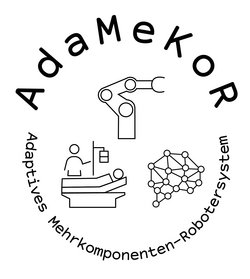AdaMekoR
Adaptive multi-component robot system for care

The AdaMeKoR project is developing an adaptive and multifunctional motorized bed with a robotic arm system for use in care. Nursing staff and care recipients should be supported in everyday, physically stressful care activities on the nursing bed. For this purpose, sensor components are developed in order to be able to adjust the bed position depending on the situation, for example. Various holding and support functions of the robot arm are tested in the nursing laboratory, for example for bed-wheelchair transfer or the application of objects. The system is also intended to continuously monitor the posture of the nurses during the mobilisation or transfer of care recipients and to provide guidance on optimisation in the event of unfavourable loads. A partially automated bed-robot arm system can improve the autonomy and quality of life of care recipients. For carers, robotic support for lifting and moving a patient represents a significant reduction in physical stress. This prevents damage or diseases of the lower back area.
| Duration: | 15.03.2020 till 14.09.2023 |
| Donee: | German Research Center for Artificial Intelligence GmbH |
| Sponsor: | Federal Ministry of Education and Research |
| Grant number: | Funded by the Federal Ministry of Education and Research with grant no16SV8534. |
| Partner: |
Johanniter-Unfall-Hilfe e. V. - Regionalverband Weser-Ems, Elsfleth Carl von Ossietzky Universität Oldenburg Universität Osnabrück |
| Application Field: | Assistance- and Rehabilitation Systems |
Project details
Nursing staff who care for people with mobility disabilities often get back and joint problems because the strain on muscles and skeleton is enormous. As a result, absences or even incapacity for work occur, in the case of already scarce nursing staff.
In order to counter the growing discrepancy between the required and the available number of nurses, innovative concepts are required that are easy to use and offer real added value for physically demanding tasks without restricting the work processes.
In addition to the development and implementation of the AdaMeKoR concept, the DFKI RIC developed further approaches for the implementation of a robotic solution for the transfer of patients. In particular, the focus should be on solutions to relieve nursing staff when transferring patients with a higher body weight without reducing patient well-being. The aim is a space-saving robotic solution with a good force / weight ratio, so that it can be attached to a care bed, for example.
Videos
AdaMeKoR: An easy-to-use robot arm for people in need of care

In the AdaMeKoR project, two DFKI research departments – Robotics Innovation Center and Cyber-Physical Systems – and their partners are working on adaptive robotic solutions for the area of care. Robotics can not only contribute to supporting overworked nursing staff in many tasks, but also give more autonomy to patients with a limited ability to move. For this reason, the Cyber-Physical Systems research department is developing control mechanisms for the robot arm Jaco by the Canadian company Kinova, which can already be used in the nursing sector in Germany. In the video, DFKI researcher Felix Goldau shows what data is being collected to develop a simpler controller for the arm that can help, for example, with drinking.
AdaMeKoR: A concept for facilitating the nursing bed-wheelchair transfer

The animation illustrates the concept of an automatic segmental mattress used in combination with an active support arm. This combination aims to facilitate transfers for both caregivers and care recipients by using targeted deformations of the mattress. The position control of the individual mattress segments supports the natural movement sequence. In addition, all the standard functions of a healthcare bed can be covered in this way, and the positioning of persons in need of care can be simplified.
![AdaMekoR In the project AdaMeKoR, concepts are being developed to enable the safe, robot-assisted transfer of patients with higher body weight.[Graphic: Adobe Stock, DFKI, Annemarie Popp]](/fileadmin/_processed_/f/0/csm_Infografik_Adamekor_blau_RGB_22a846c777.jpg)
